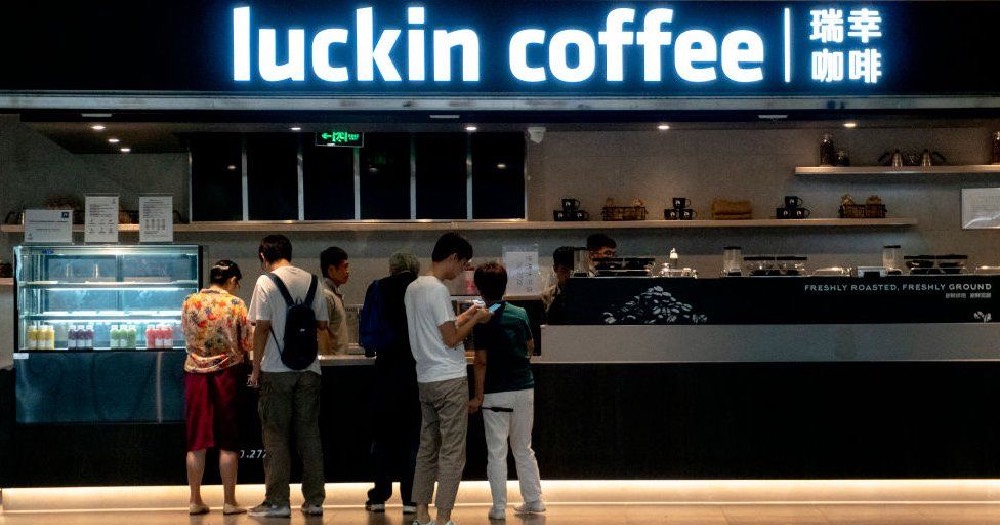Follow us on Telegram for the latest updates: https://t.me/mothershipsg
Once dubbed the Starbucks of China, Luckin Coffee has admitted to fabricating US$310 million in sales, and will be paying a settlement of up to US$187.5 million (S$253 million) in a class action lawsuit filed in the U.S., China-based media TechNode reported.
The co-founder and former CEO of Luckin Coffee, Jenny Qian once said the company's goal was to "defeat Starbucks" in China, according to Bloomberg.
Before news of its fraudulent practices broke, the coffee chain company reportedly opened 5,000 stores throughout China, and announced its quarterly sales volume at up to US$200 million (S$270 million) in 2019.
The company reportedly tried to challenge Starbucks by offering coffee at a lower price, targeting sales in the form of delivery and takeaways.
Backed by BlackRock and GIC
Luckin Coffee marketed itself as a tech company and a potential disruptor of China's coffee business, and offered drinks at a third of Starbuck's prices through their app at one point in time, the Wall Street Journal (WSJ) reported.
Founded in 2017, the company reportedly rode on the wave of funding for Chinese technology companies, and was already valued at US$1 billion (S$1.35 billion) after just seven months of launching.
The company also reportedly wooed American investment giant BlackRock Inc., Singaporean sovereign wealth fund GIC, and other investment funds to invest over US$500 million (S$675.5 million) in its business.
According to Reuters, GIC had first invested during private funding rounds in 2018, before Luckin’s initial public offering in 2019.
Joy Capital -- one of the largest venture capital firms in China that also invested in Luckin Coffee -- previously said the coffee chain had plans to operate 10,000 stores by the end of 2021, according to Bloomberg.
In the wake of Luckin's accounting scandal, GIC had trimmed its direct holdings in Luckin Coffee to less than 1 per cent, though it still holds an indirect stake through its investments in Centurium Capital Partners, according to a Financial Times (FT) report published in April 2020.
The founder of Centurium Capital, David Li, reportedly expressed that he was "shocked" by the news of Luckin Coffee's "alleged fabrications".
Investment research firm labelled Luckin as a fraud
Things came crashing down for Luckin Coffee in February 2020, after investment research firm and short seller Muddy Waters Research published an 89-page document, detailing Luckin Coffee's "fraud" and "fundamentally broken business".
MW is short $LK. We received unattributed 89-page report alleging $LK is a fraud: "number of items per store per day was inflated by at least 69% in 2019 3Q and 88% in 2019 4Q, supported by 11,260 hours of store traffic video" We view the work as credible. https://t.co/N3rXlrvfcZ
— MuddyWatersResearch (@muddywatersre) January 31, 2020
According to Bloomberg, Muddy Waters was approached by a fund manager who was probing Luckin Coffee's business in late 2019, and the fund manager proposed for Muddy Waters to publish the research as he did not want to bear the potential "fallout".
Naming it "smoking gun evidence #1", the document pointed out that Luckin Coffee was inflating the number of items sold per store per day by "at least 69 per cent" in the third quarter of 2019, and 88 per cent in the following quarter.
The data for the research was gathered by 92 full-time and 1,418 part-time staff over the course of 981 days, and covered 100 per cent of the stores' operating hours, according to the published document.
The research also found that Luckin Coffee had inflated the cost of their items, and "intentionally" skipped order numbers to give an impression of a higher sales volume.
Luckin Coffee initially denied fraud accusations
Luckin Coffee initially denied the accusations of fraudulent practices, labelling the findings in the research as "misleading and false" in a company statement released on Feb. 3, 2020.
However, in a subsequent statement on Apr. 2, 2020, the company later acknowledged the fabricated transactions that had begun in the second quarter of 2019.
The company pointed the finger at their CEO and director at the time, Jian Liu, and several other employees who reported to him.
Additionally, the company said investors "should not rely" on the financial statements and earnings releases for the nine months up till Sep. 30, 2019, and the two quarters from Apr. 1 till Sep. 30 in the year 2019.
As a result, Luckin Coffee's shares slid over 80 per cent, marking over US$5 billion (S$ 6.74 billion) in investors' losses, the WSJ reported.
Not throwing in the towel yet
Despite all the drama involved, Luckin Coffee is not giving up just yet.
In a company statement on Sep. 21, the chairman and CEO of the company, Jinyi Guo, acknowledged the company's plans to pay the settlement of US$187.5 million (S$253 million), and elaborated that the settlement would "resolve a significant contingent liability", and allow the company to "move forward" with greater focus.
Luckin Coffee also announced that their stores remain "open for business", in another statement addressing the company's plans of restructuring its debts.
Follow and listen to our podcast here
Top image via BBC/Getty Images
If you like what you read, follow us on Facebook, Instagram, Twitter and Telegram to get the latest updates.
